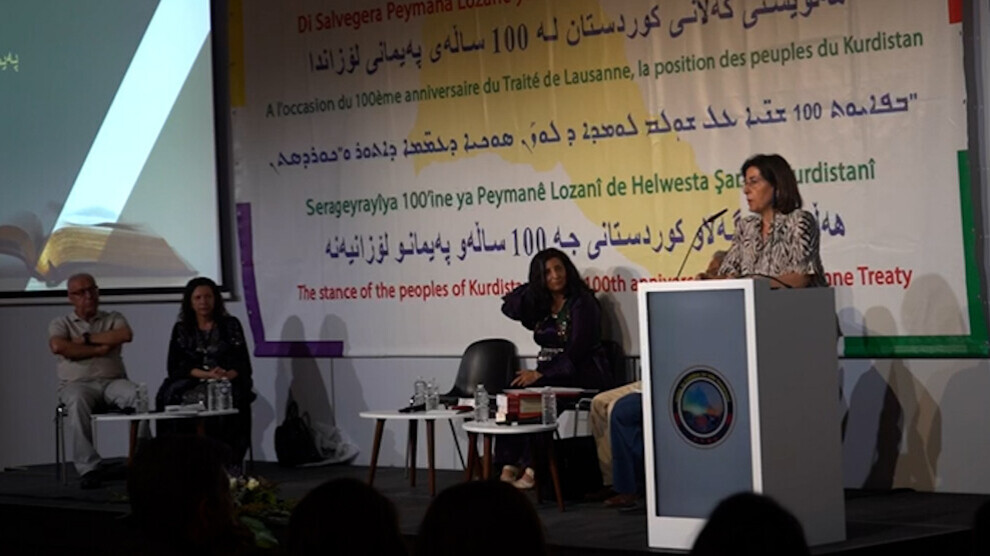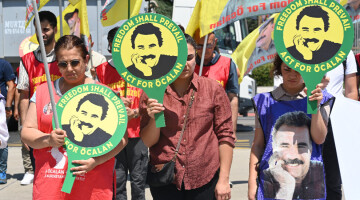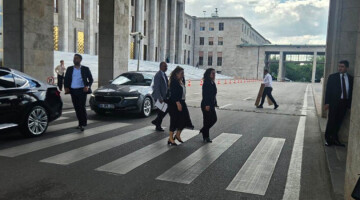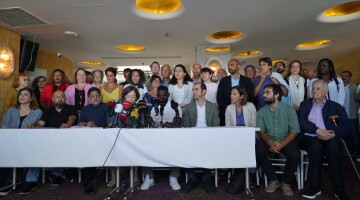Organized by the Kurdistan National Congress (KNK) on the occasion of the 100th anniversary of the Treaty of Lausanne, the conference "The stance of the peoples of Kurdistan on the 100th anniversary of the Treaty of Lausanne" will continue today.
On Saturday, the day ended with a panel on "The Treaty of Lausanne and its consequences in Kurdistan".
The panel was moderated by Selma Irmak and Xelîl Xezerî. International Relations Historian Dr. Suheyla Qadirî from Salahaddin University, Narmen Muhamad Amen Ali and researcher and writer Mehmet Bayrak were the speakers together with co-chair of the Coordination Committee of Northern and Eastern Syria Universities. Abdulilah Al Mustafa could not attend because he could not get a visa.
Serbilind: Let's create a national strategy
Before the panel, the chair of Partiya Îslam a Kurdistanê Hikmet Serbilind spoke about the Treaty of Lausanne and said: "All the states occupying Kurdistan are Muslims. They did not see the rights of the Kurds as they saw their rights. They considered it permissible to kill Kurds. I have never trusted the Islamic states that have invaded Kurdistan."
Noting that the Kurdish people should hold their national congress and pursue a policy of unity, Serbilind said: "Today, an understanding of unity has emerged in the minds, brains and hearts of every Kurdish person. A national idea was formed. The political parties should fulfil the wishes of our people. Let's create a national representation, a strategic union, and let's become a state in our lands."
Hüseyin: The states that signed the Treaty of Lausanne are against Kurdish people
Hasan Hüseyin spoke on behalf of the KAWA Organization. Reminding that this treaty, which denied and destroyed the Kurds 100 years ago, favoured genocide with the signature of France, England and other signatory states, Hüseyin, said: "These states are guilty in the eyes of the Kurdish people. Also, the Swiss state that hosted this treaty is guilty in the eyes of the Kurdish people."
Irmak: We will take decisions to prevent genocide
After those speeches, the panel "The Treaty of Lausanne and its consequences in Kurdistan” started. Former HDP MP Selma Irmak said: "The Treaty of Lausanne tried to destroy the Kurds, but it failed because of their resistance. We will take important decisions here today so that the next century will not see a genocide. We will show our will and our hope. We will take decisions that will show not only the work of law and diplomacy, but also the work of the people."
Amen Ali: A tool of pressure has been established in regional states
The first panelist, Prof. Narmen Muhamad Amen Ali spoke about the reflection of the relations between international hegemonic powers and regional powers to the Kurdish people. Amen Ali stated that as a result of the cooperation between hegemonic powers and the regional states, a treaty for the extermination of the Kurds emerged in Lausanne. He added that in this way the Kurds were left without status and a means of pressure was created on the regional states.
Suheyla Qadirî: National unity is important for Kurds in the new century
Dr. Suheyla Qadirî said that the Treaty of Lausanne had social, political, cultural and geographical consequences for the Kurdish people. She added that the will of Kurdish political movements to decide and act together has the power to eliminate these consequences and gave examples from history. She also talked about the importance of national unity for the Kurds in the new century.
Mehmet Bayrak: The Kurdish people should protect their language
Researcher and writer Mehmet Bayrak said that one of the biggest consequences of the Treaty of Lausanne was the beginning of practices aimed at the destruction of the Kurdish language. He said that the use of Kurdish in daily life and Kurdish literature resisted this effort to destroy it and said that this situation has become dangerous today.
Bayrak expressed his concern over the weakening of the Kurdish language in daily life, especially in the Kurdish provinces west of the Euphrates River, in North Kurdistan. Bayrak said that it is important for the Kurdish people to speak Kurdish in their daily life in order to preserve their language, and pointed out the importance of mothers speaking Kurdish to their children. Bayrak also wanted the Kurds to act together against the Treaty of Lausanne.












